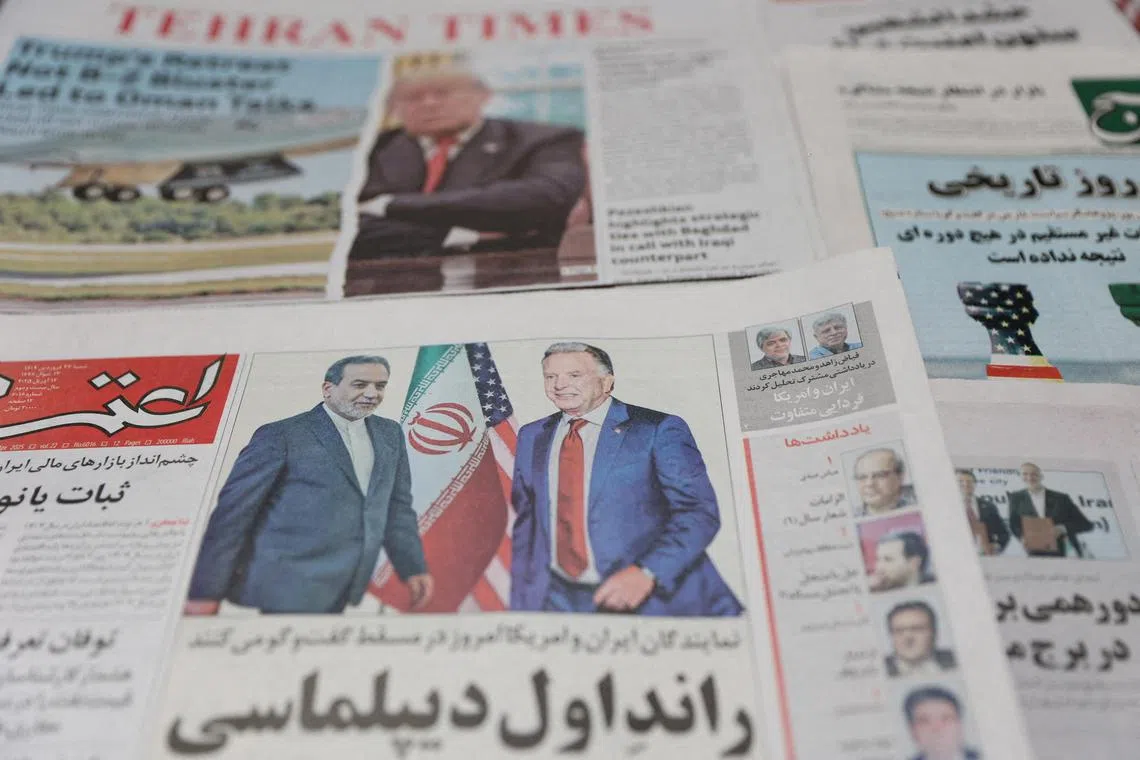With his promises of peace unmet in Gaza and Ukraine, Trump may find Iran just as tough
Sign up now: Get ST's newsletters delivered to your inbox

US President Donald Trump said on April 18 that he was not in a rush to strike Iran, insisting that negotiations were his first option.
PHOTO: REUTERS
Follow topic:
WASHINGTON - With his campaign promises to quickly bring peace to Gaza and Ukraine unfulfilled, US President Donald Trump has turned to another high-profile challenge that could be just as elusive: curbing Iran’s escalating nuclear programme.
His administration plans a second round of talks with Iran on April 19 in Rome that few thought possible after years of hostility dating back to the Republican President’s first term, when he scrapped a 2015 nuclear deal and imposed a “maximum pressure” campaign of crippling sanctions.
While no one is ruling out the potential for progress after a meeting in Oman last weekend that both sides described as positive, negotiators are lowering any expectations of a swift breakthrough in the decades-long dispute.
Debate on elements of a potential nuclear deal framework is at a very early stage among Mr Trump’s aides, said a source briefed on a White House meeting with the President on April 15.
The two sides could reach an interim deal ahead of a more detailed agreement, said two sources familiar with White House thinking.
Adding to regional tensions surrounding the diplomatic effort is Mr Trump’s repeated threat to bomb Iran’s nuclear sites if a deal cannot be reached.
That would mean that Mr Trump, who pledged in his Jan 20 inauguration speech to be a “peacemaker”, could drive the US into a new conflict in the Middle East.
Mr Trump said on April 18 that he was not in a rush to strike Iran
“If there’s a second option, I think it would be very bad for Iran,” Mr Trump said during a White House meeting with Italian Prime Minister Giorgia Meloni. “I think Iran is wanting to talk. I hope they’re wanting to talk. It’s going to be very good for them if they do.”
Leading the US negotiating team is Mr Steve Witkoff, a friend of Mr Trump and real estate investor with no prior diplomatic experience, who some analysts have nicknamed the administration’s “envoy for everything”.
He has been tasked with getting a deal with Iran, in addition to ending the wars in Gaza
Across the table will be Iran’s Foreign Minister, Mr Abbas Araghchi, a shrewd negotiator who some Western diplomats worry will take advantage of Mr Witkoff’s lack of expertise.
“Having to balance Gaza and Ukraine and Iran would be a challenge from a bandwidth perspective for anyone,” said Mr Jonathan Panikoff, former deputy US national intelligence officer on the Middle East, of Mr Witkoff’s assignment.
“But that’s especially (the case) with Iran, given the amount of technical details, history, regional geopolitical considerations and broader complexities,” added Mr Panikoff, now with the Atlantic Council think-tank in Washington.
Mr Witkoff has one distinctive negotiating asset: his direct line to Mr Trump, which should signal to the Iranians they are getting the President’s views from someone he trusts.
Whether that will help the administration’s effort to secure a deal remains to be seen.
Uncertainty
Mr Witkoff’s own comments in recent days have injected further uncertainty over Mr Trump’s endgame with Iran.
Ahead of April 12’s talks, he told The Wall Street Journal last week that the red line would be “weaponisation” of Iran’s nuclear programme, seeming to back away from Mr Trump’s demand for full dismantlement.
He then told Fox News on the night of April 14 that Iran could be allowed to enrich uranium at a low level but only with strict verification, before appearing to backtrack on April 15, saying in a post on X that Iran must “eliminate” its enrichment programme
In response, Mr Araghchi said on April 16 that “the principle of enrichment is not negotiable”.
Harsh sanctions on Iran appear to have helped draw the Opec member nation to the negotiating table.
But Tehran, which has long denied Western and Israeli accusations that it seeks a nuclear weapon, has approached the talks warily, suspicious of Mr Trump and doubting the likelihood of an agreement.
Since Mr Trump withdrew from the international nuclear accord
Mixed diplomatic record
Mr Trump’s surprise announcement on April 7 of a resumption of talks with Iran spotlighted Mr Witkoff’s central role in the administration’s foreign policy.
Mr Witkoff’s record so far has been mixed.
He has had no success securing a deal between Russia and Ukraine
Shortly before Mr Trump took office, he helped secure a long-sought ceasefire in Gaza between Israel and Hamas militants, a deal that has since unravelled. Possible US or Israeli military action is keeping the Middle East on edge.
Israel, which has severely weakened Iran’s regional influence since the Palestinian group Hamas’ attack on Israel on Oct 7, 2023, has long left little doubt that it could strike Iran’s nuclear sites to thwart what it considers an existential threat.
Caught off guard by Mr Trump’s decision to negotiate with Iran, Israeli Prime Minister Benjamin Netanyahu has urged a denuclearisation deal like the one that Libya signed in 2003 – a deal Tehran is considered highly unlikely to accept.
Gulf states, nervous about another Middle East war, hope the negotiations continue but are concerned about being left out of the process, Gulf sources said.
Some analysts suggest that despite the steep obstacles to an Iran deal, a two-party agreement between the US and Iran still might be less of a long shot for Mr Trump than forging lasting peace between the warring sides in Gaza and Ukraine.
“As a party to a nuclear agreement, the US can assert some measure of control,” said Ms Laura Blumenfeld, a Middle East analyst at the Johns Hopkins School of Advanced International Studies in Washington.
“Both are ready and eager to end nuclear tensions.” REUTERS

